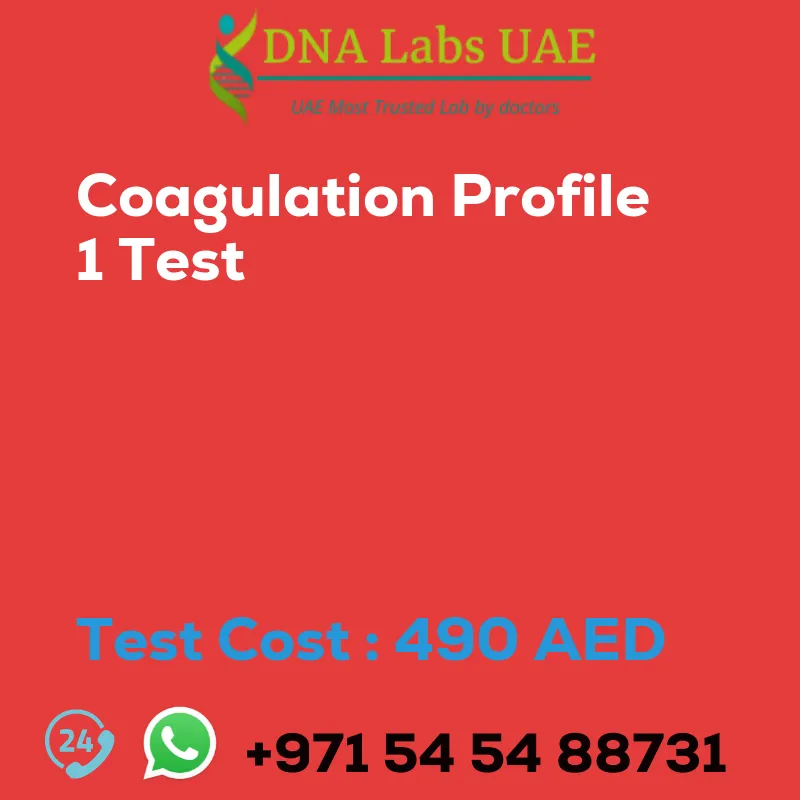COAGULATION PROFILE 1 Test
Test Cost: AED 490.0
Symptoms Diagnosis:
Test Name: COAGULATION PROFILE 1 Test
Components: CBC, BT, CT, Prothrombin studies, APTT, Thrombin Time (Does not include Factor VIII assay)
Price: 490.0 AED
Sample Condition:
– 3 mL (1.5 mL min.) whole blood in 1 Lavender Top (EDTA) tube. Ship refrigerated. DO NOT FREEZE
– 3 mL whole blood in 1 Blue Top (Sodium Citrate) tube. Mix thoroughly by inversion. Transport to Lab within 4 hours. If this is not possible, make PPP within 1 hour of collection as follows:
1. Centrifuge sample at 3600 rpm for 15 min. & transfer supernatant to a clean plastic tube.
2. Centrifuge this supernatant again at 3600 rpm for 15 mins. & finally transfer the supernatant (PPP) to 1 labelled, clean plastic screw capped vial.
3. FREEZE IMMEDIATELY. Ship frozen. DO NOT THAW.
Overnight fasting is preferred. Duly filled Coagulation Requisition Form (Form 15) is mandatory.
Report Delivery: Daily
Method: Electrical Impedence, Photo-optical Clot Detection, Ivy, Lee & White
Test Type: Disorders of Coagulation
Doctor: Hematologist, Physician
Test Department:
Pre Test Information: Duly filled Coagulation Requisition Form (Form 15) is mandatory.
Test Details:
The Coagulation Profile 1 test, also known as a prothrombin time (PT) test, is a blood test that measures the time it takes for blood to clot. It is used to evaluate the functioning of the clotting factors in the blood and to monitor the effectiveness of anticoagulant medications.
During the test, a blood sample is collected from a vein in the arm. The sample is then sent to a laboratory, where it is mixed with a substance that triggers the clotting process. The laboratory technician measures the time it takes for the blood to clot.
The results of the Coagulation Profile 1 test are typically reported as the PT time in seconds or as the international normalized ratio (INR). The PT time measures how long it takes for the blood to clot compared to a normal control sample, while the INR standardizes the PT time across different laboratories.
Abnormal results on the Coagulation Profile 1 test may indicate a bleeding disorder, liver disease, vitamin K deficiency, or the presence of anticoagulant medications. Depending on the specific abnormality detected, further testing may be necessary to determine the underlying cause.
Overall, the Coagulation Profile 1 test provides valuable information about the clotting ability of an individual’s blood and is an important tool in diagnosing and monitoring coagulation disorders.
| Test Name | COAGULATION PROFILE 1 Test |
|---|---|
| Components | *CBC*BT*CT*Prothrombin studies *APTT *Thrombin Time Does not include Factor VIII assay |
| Price | 490.0 AED |
| Sample Condition | 3 mL (1.5 mL min.) whole blood in 1 Lavender Top (EDTA) tube. Ship refrigerated. DO NOT FREEZE AND \n 3 mL whole blood in 1 Blue Top (Sodium Citrate) tube. Mix thoroughly by inversion. Transport to Lab within 4 hours. If this is not possible, make PPP within 1 hour of collection as follows: Centrifuge sample at 3600 rpm for 15 min. & transfer supernatant to a clean plastic tube. Centrifuge this supernatant again at 3600 rpm for 15 mins. & finally transfer the supernatant (PPP) to 1 labelled, clean plastic screw capped vial. FREEZE IMMEDIATELY. Ship frozen. DO NOT THAW. Overnight fasting is preferred. Duly filled Coagulation Requisition Form (Form 15) is mandatory. |
| Report Delivery | Daily |
| Method | Electrical Impedence, Photo-optical Clot Detection, Ivy, Lee & White |
| Test type | Disorders of Coagulation |
| Doctor | Hematologist, Physician |
| Test Department: | |
| Pre Test Information | Duly filled Coagulation Requisition Form (Form 15) is mandatory. |
| Test Details | The Coagulation Profile 1 test, also known as a prothrombin time (PT) test, is a blood test that measures the time it takes for blood to clot. It is used to evaluate the functioning of the clotting factors in the blood and to monitor the effectiveness of anticoagulant medications. During the test, a blood sample is collected from a vein in the arm. The sample is then sent to a laboratory, where it is mixed with a substance that triggers the clotting process. The laboratory technician measures the time it takes for the blood to clot. The results of the Coagulation Profile 1 test are typically reported as the PT time in seconds or as the international normalized ratio (INR). The PT time measures how long it takes for the blood to clot compared to a normal control sample, while the INR standardizes the PT time across different laboratories. Abnormal results on the Coagulation Profile 1 test may indicate a bleeding disorder, liver disease, vitamin K deficiency, or the presence of anticoagulant medications. Depending on the specific abnormality detected, further testing may be necessary to determine the underlying cause. Overall, the Coagulation Profile 1 test provides valuable information about the clotting ability of an individual’s blood and is an important tool in diagnosing and monitoring coagulation disorders. |







